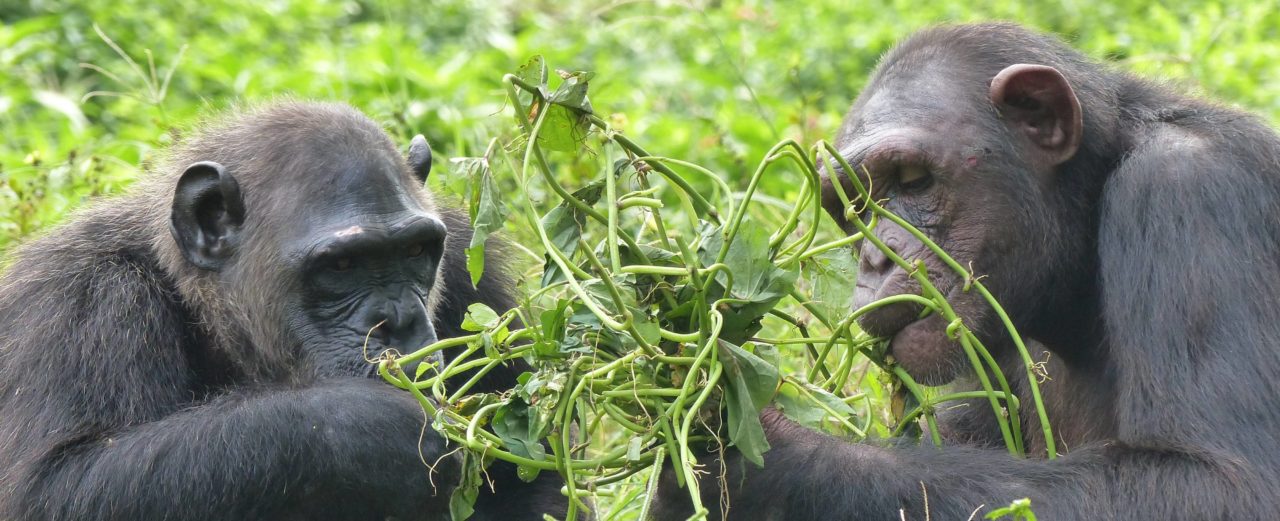 Let the ape have ginger!
Let the ape have ginger!
Protection of great apes - working together with the local population
Be it in TV ads, computer games, shirt designs or feature films: according to the cliché, monkeys feed on bananas. Why is that? After all, bananas originate from Southeast Asia, were only brought to Africa a few hundred years ago and are therefore not part of the natural diet of gorillas and chimpanzees. In nature, these endangered great apes feed mainly on various wild plants (Stanford & Nkurunungi, 2003). The right mix, including immune-boosting wild ginger, is essential for their health (Cousins & Huffman, 2002). In Cameroon, former poachers are increasingly becoming conservationists: among other things, they collect wild ginger for the wholesome and natural diet of endangered apes. And local women farmers also profit from selling plants to the ape orphanage. This shows a way how people and nature can live together successfully!
Necessity
Wholesome and varied green feed for endangered gorillas, chimpanzees and other apes in Cameroon.
Activity
Former poachers collect wild plants and local farmers' wives sell green feed for the charges in the sanctuary.
Countable effort
For every donation, the monkeys at the LWC sanctuary receive 4.7 kilograms of plant mix.
Result
This ensures the long-term nutrition of 200 primates. Up to 200 people from Batoke receive a secure and ecologically sustainable income from the Green Project and become active conservationists.
Systemic effect
Poaching declines, the chances of survival of gorillas, chimpanzees and other wild animals thus increase permanently.
Background
Gorillas are acutely threatened with extinction (Maisels et al., 2018), chimpanzees highly endangered (Humle et al., 2016). The gorilla population is declining by up to 30,000 animals per year, mainly due to poaching (Maisels et al., 2018). The decline in chimpanzee populations is also alarming (Humle et al., 2016). In Cameroon and many other countries in Central and West Africa, apes are hunted for ‘bushmeat’ (Mbete et al., 2011; Rose, 1996). Gorillas and chimpanzees are particularly sought after despite strict protection. This is because ammunition is expensive and hunters prefer the largest possible prey (Wright & Priston, 2010). In addition, the meat and body parts of chimpanzees and gorillas are believed to have restorative or healing properties (Angwafo & Chou, 2016; Etiendem et al., 2011).
In order to stop poaching, two aspects are particularly important: education and involvement of the local population, which should benefit directly from the protection of the animals (Robbins, 2020). The Limbe Wildlife Centre in southwest Cameroon cares for about 200 rescued primates, including 43 chimpanzees and 15 gorillas: With about 40,000 visitors a year, its youth group Nature Club and educational events in the region, the sanctuary does important work to raise awareness. In addition, the Green Project actively involves former poachers and their families, who live on the edge of a nearby national park, in the protection of the apes and provides them with new sources of income.
The good deed
Today's good deed of 4.7 kilograms of plant mix ensures health and varied nutrition for 200 endangered primates at the Limbe Wildlife Centre (LWC). At the same time, the sale of feed plants provides an alternative, environmentally sound and sustainable income for the local people, who used to live mainly from hunting and also poached in the nearby Mount Cameroon National Park. The Green Project ensures the support of the local community for conservation measures and compliance with wildlife protection laws. More and more inhabitants of the village of Batoke are taking part in the project: currently there are 110 people, and the number is growing. Former hunters now harvest wild ginger (Aframomum) as a natural remedy against infectious diseases. The women also sell the greens from the harvest of potatoes, papayas and manioc, for which there is otherwise no market, to the rescue centre.

AboutCameroon
Jaunde
Capital
26,545,864
Number of inhabitants
1,499 USD
Gross domestic product per capita per year
153 of 189
Human Development Index
Cameroon is the only country where both subspecies of the western gorilla can be found, the western lowland gorilla (Gorilla gorilla gorilla) and the cross-river gorilla (Gorilla gorilla diehli).
About the organization and further information
Association
Pro Wildlife e.V.
Website

Further information and source
- Angwafo, T.E. & Chou, M.D., 2016. Contributions of Indigenous Knowledge of Gorilla (Gorilla gorilla diehi), Chimpanzee (Pan troglodytes ellioti) and Buffalo (Syncerus caffer) Conservation, in Waindow, North West Cameroon, Annual Research & Review in Biology 11(2): S. 1-14.
- Cousins D. & Huffman, M.A., 2002. Medicinal properties in the diet of gorillas: an ethno-pharmacological evaluation, African Study Monographs 23(2): S. 65-89.
- Etiendem, D. N., Hens, L. & Pereboom, Z., 2011. Traditional Knowledge Systems and the Conservation of Cross River Gorillas: a Case Study of Bechati, Fossimondi, Besali, Cameroon, Ecology and Society 16(3): 22.
- Humle, T. et al., 2016. Pan troglodytes (errata version published in 2018). The IUCN Red List of Threatened Species 2016, Stand 25.08.2021, Gland.
- Maisels, F., Bergl, R. A. & Williamson, E. A., 2018. Gorilla gorilla (amended version of 2016 assessment). The IUCN Red List of Threatened Species 2018, Stand: 01.04.2021, Gland.
- Mbete, R. A. et al., 2011. Household bushmeat consumption in Brazzaville, the Republic of the Congo, Tropical Conservation Science Vol.4 (2): S. 187-202.
- Pro Wildlife e. V., 2021. Artenschutz mit der lokalen Bevölkerung - Ernten statt wildern: Futteranbau für das Affenwaisenhaus, Stand: 01.04.2021, München.
- Robbins, M.M., 2020. Assessing attitudes towards gorilla conservation via employee interviews, American Journal of Primatology (in print).
- Rose, A. L., 1996. The African Great Ape Bushmeat Crisis, Pan Africa News 3(2).
- Stanford, C. & J. Nkurunungi, 2003. Behavioral Ecology of Sympatric Chimpanzees and Gorillas in Bwindi Impenetrable National Park, Uganda: Diet, International Journal of Primatology 24: S. 901-918.
- Wright, J.H. & Priston, N. E., 2010. Hunting and trapping in Lebialem Division, Cameroon: bushmeat harvesting practices and human reliance, Endangered Species Research 11: S. 1-12.




